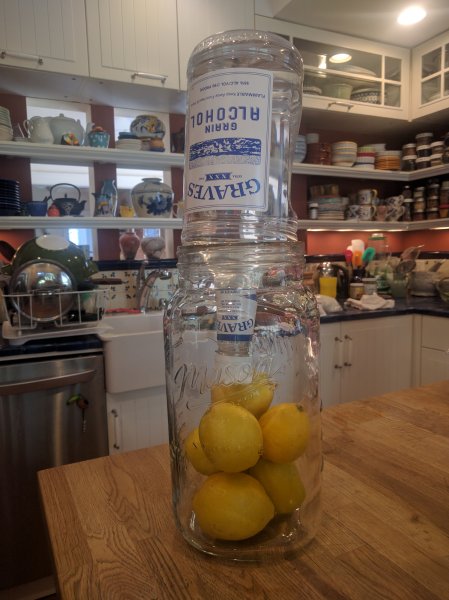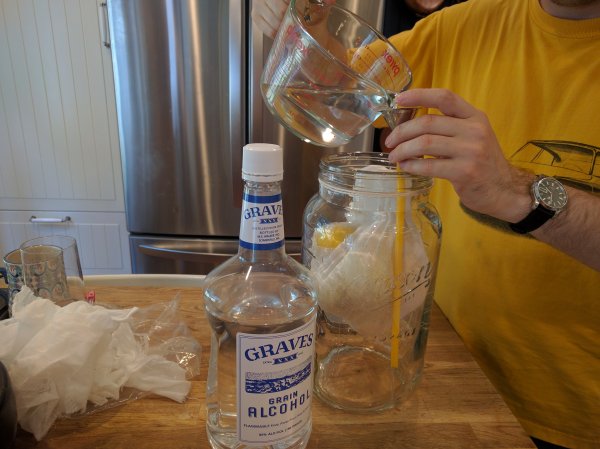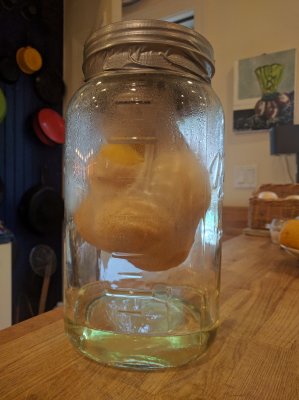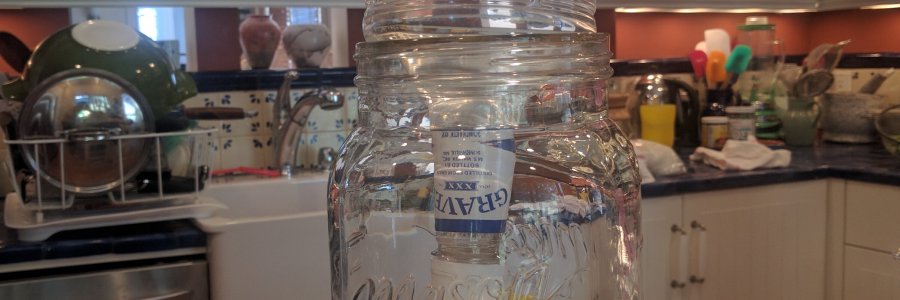Making limoncello is simple.

Ok, maybe not that simple, but it can be close. Limoncello consists of lemon peel, alcohol, and sugar. How these three ingredients are combined can be incredibly simple (just throw them together in a jar) but it can also be complicated and weird. Can you guess which method I use.
My limoncello recipe is taken largely from an article published on Gizmodo a few years ago. I have made a few changes in the ingredient ratios, as well as a few technical refinements. The key element is that whole lemons are suspended above alcohol, rather than peeled and steeped. The high-proof alcohol evaporates inside the jar, and then condenses on the lemons, where it works it's solvent magic. Once enough liquid accumulates on the lemons, it drips back down, taking a bit of flavor with it.
I think the biggest advantage to this method is that the pith is completely avoided. When making limoncello by the more standard method, you have to peel the lemons and steep the peel in alcohol. The worst thing that can happen is that some of the pith (the white part of the peel) sneaks in, which will make the final product bitter. With the suspension method, the whole lemons macerate from the outside in. No exposed pith means no bitterness.
Beyond the technical advantages, I also like the pace of the process. The alcohol has to work to reach the lemons, and once it does, it only has a short time to extract flavor before it falls back down to the bottom of the jar. Maybe a good analogy is french press coffee versus stove-top espresso. The flaw in the analogy is that I use a Chemex. However, the analogy actually works well when you consider that the results of both techniques are good but different. Risk of bitterness aside, steeping produces an excellent liqueur. The suspended spirit is light, but very sharp and oily at the same time. Steeped spirit has an darker, fruitier flavor, and also tends to have a more intense color. Gizmodo's advice is to use the best of both worlds. I follow their advice.
Recipe
Suspended Portion
- 8 lemons
- 400ml Grave's 190 (or equivalent)

- Thoroughly wash the lemons, and tie them up in cheese cloth.
- Hang them inside a large, wide mouthed jar. (If you can't find a big enough jar, split the recipe up to fit what you have.)
- Pour alcohol into the jar. (I don't know if it's necessary but I avoid pouring directly onto the lemons by using a funnel and a straw.)
- Seal the jar and let sit at room temperature for one month. (I do not recommend putting the jar in the basement, as the alcohol will not evaporate and reach the lemons if it's too cold.)

Steeped Portion
- 2 lemons
- 400ml Grave's 190 (see below for how I came up with this quantity.)
- Wash lemons and grate the peel. (Be carefull to avoid the pith.)
- Steep in alcohol for 15 minutes stirring occasionally.
- Filter and add to suspended portion
Sweetening and Diluting
- Dissolve 8 oz sugar in 8 oz water.
- Add to alcohol.
- Add more water until total volume is 1.5 liters.
- Chill and drink.
I like to make my Limoncello around 70 proof which is a bit stronger than usual. Over a month, the suspended portion loses both alcohol content and overall volume. If the jar isn't perfectly sealed, there will be some evaporation, but I think the real culprits are the lemons themselves. (For educational purposes only, taste a small piece of one of the used lemons. I do not recommend eating the whole thing.) Based on my experience so far, the remainder will be about 300ml at about 100 proof. Add that to the 400ml at full proof and we have 700ml at about 151 proof. Bring the total volume up to 1.5 liters, and the alcohol content will be 70 proof. If you can't find 190 proof grain alcohol, you will have to do your own calculations.
I will write another post in about a month with photos of the second half of the process. I've taken a bit more time away from the blog than I had intended. I blame Whisky Wednesday's at Gordon's in Boston for filling my cabinet with things other than vermouth and amari. That said, I have a few other things in the pipeline now, so stay tuned.
